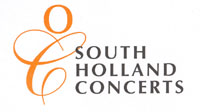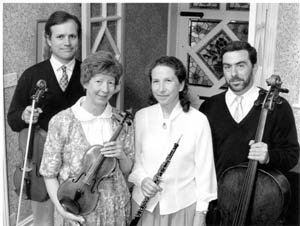Programme
Vanhal: Oboe Quartet
Schubert: String Trio
Gordon Jacob: Oboe quartet
****************
Dohnanyi: String Trio
Mozart: Oboe Quartet
QUARTET no. 6 op.7 in
C major JAN VANHAL (1739-1813)
Allegro
Andante
Menuetto - Trio - Menuetto
Presto
Czech composer Jan Vanhal (frequently known by his German
name - Johann Baptist Wanhal) was born in Bohemia, and started musical
education in singing, violin and keyboard from the age of eight. By
the time he was eighteen, Vanhal had become organist in the Czech town
of Opocno. This was soon followed by the more important post as choirmaster
at Hnevceves. In around 1759, by travelling to Vienna, Vanhal was able
to study with the composer Dittersdorf, and soon acquired a reputation
as an accomplished musician and teacher.
Later in his life, Vanhal visited many European cities,
giving concerts and providing music for royal and noble courts. For
example, he was chief musician to the court at Dresden. However, by
the mid-1770s he began to suffer a mental illness, from which he never
really fully recovered. However, in his later years he worked as a freelance
musician, performing in various chamber music groups - including a string
quartet with Mozart, Haydn and Dittersdorf.
His numerous compositions included symphonies, concertos
and music for small ensembles, and may have been somewhat eclipsed by
the music of more famous European contemporaries such as Haydn, Mozart
and Beethoven. Yet his voice is characteristically his own, and his
handling of stylist matters and delicacy of instrumentation shows considerable
individuality and imagination.
The Six Quartets op.7 date from around 1771, and although
sometimes published with a flute option they are, clearly, best suited
to the oboe. However, a year earlier Vanhal composed a similar set of
six equally delightful quartets in which he expressly indicated a flute
as the solo instrument.
ALLEGRO for STRING TRIO
in Bb D.471 FRANZ SCHUBERT (1797-1828)
This is a relatively early work dating from around 1816.
Schubert composed this joyful Allegro, together with a few bars of an
Andate, for an intended string trio - yet the remainder of the work
remained uncompleted. Later, he did, however, compose a completely new
string trio in Bb (D.581), and another in the same key for piano with
strings (D.898).
The single movement work we will hear tonight is very
much in the classical style of Haydn and Mozart while it displays many
of Schubert's beautiful lyrical textures. It remains a firm favourite
of players and audiences alike. Such was the prolific output of this
teenaged composer that, prior to this composition, he had already written
no fewer than 144 songs within one year while also engaged on stage
works, masses and other music for the church.
QUARTET for OBOE and STRINGS GORDON JACOB
(1895-1987)
Allegro moderato
Scherzo: Allegro moderato
Andante semplice
Rondo: Allegro molto
Among those who play either woodwind or brass, and those
who simply love the repertoire of these instruments, there is often
a special affection for the music of Gordon Jacob. He composed over
seven hundred works before his death at the age of 88, and his contribution
to the musical life of this country has been enormous. Yet, sadly, much
of his music is not widely performed. He composed imaginatively and
sympathetically for each solo instrument - strongly evident in the many
wind and string Concertos which he composed throughout his long life.
To the general musical public, however, he is probably best known for
his film scores and his glorious arrangement of the National Anthem.
Brilliant, too, are his superb orchestral arrangements of both Holst's
famous Suite in Eb (originally for military band) and Elgar's rousing
Organ Sonata.
Jacob's complete understanding of the colours and sonorities
of wind instruments is, perhaps, most obviously appreciated in his chamber
music. This repertoire is large, mostly tuneful, and highly accessible.
The pieces range from short, charming duos and trios to full-scale concert
works such as this Oboe Quartet - inspired by the leading oboist of
his day, Leon Goossens. This is altogether more substantial than many
of his chamber pieces, displaying a characteristic 'Englishness' of
voice. (Jacob was a frequent correspondent of Vaughan Williams.)
Following a first London performance by Goossens in 1938,
it became immediately popular with audiences. As well as superb writing
for the solo instrument, this essentially cheerful piece contains some
difficult and sophisticated string writing. (Listen especially for the
playful rhythms between all instruments in the final Rondo.)
Besides chamber music, concertos and symphonic works, other notable
pieces by Jacob include a superb vocal setting of poems by Blake called
Songs of Innocence for voice and strings, a Divertimento and Prelude
and Toccata - both for orchestra.
SERENADE IN C for STRING
TRIO ERNÖ DOHNÁNYI (1877-1960)
Marcia - Allegro
Romanza - Adagio non troppo, quasi andante
Scherzo - Vivace
Tema con Variazioni - Andante con moto
Rondo (Finale) - Allegro vivace.
Erno Dohnányi is the grandfather of the well-known
conductor Christoph von Dohnányi who became principal conductor
of the Philharmonia Orchestra in 1997.
Particularly well known for his famous Variations on a
Nursery Theme for piano and orchestra, Erno Dohnányi was a prolific
Hungarian composer writing in many forms. As a pianist, he ranked among
the finest of his time. A contemporary of Béla Bartók,
he studied at the Royal Academy of Music in Budapest. Following a thriving
career as a soloist, composer and teacher, he eventually returned to
the Academy to become its Director. In 1947, he finally settled in the
United States, and died there in 1960.
Dohnányi wrote this five-movement Serenade when he was 25, having
already acquired a considerable reputation with his Piano Quintet and
String Quartet in A minor. Within its five well-contrasted sections,
this light-textured Trio is beautifully crafted and inventive, and is
a work that has long given pleasure to players and audiences alike.
(A modern transcription of the work for string orchestra, by violinist/composer
Dmitry Sitkovetsky, is also heard occasionally.)
After the vigorous opening March, the Romance features
a gentle viola melody played over a pizzicato accompaniment. The Scherzo
is a busy and energetic movement, and is followed by a second slow movement
which is a set of variations on a chorale-like theme. The final joyful
Rondo contains material largely derived from the second theme in the
opening March.
QUARTET for OBOE and STRINGS
in F (K.370) W.A.MOZART (1756-1791)
Allegro
Adagio
Rondeau
Mozart's famous Oboe Quartet was written in Munich at
the time that his opera Idomeneo was produced in around 1781. It was
composed for Friedrich Ramm, who had met Mozart earlier in Mannheim
where Ramm was principal oboist at the court orchestra. Mozart clearly
developed a love of the instrument, as four years earlier he had dedicated
another major work, his Oboe Concerto in C, to a fine oboist in the
Salzburg orchestra.
The Oboe Quartet is quite a different composition from
the works which Mozart had written for flute and strings only a few
years earlier. The oboe here is treated as an equal partner in the ensemble,
in contrast with the flute quartets where the soloist tends to assume
a more dominant role.
Though this quartet is a three-movement work (with no
Minuet), there is considerable contrast of expression within it. The
first movement, Allegro, though graceful and stylish, affords plenty
of opportunity for neat agility from the oboist.
The second movement, Adagio, in the contrasting key of
D minor, is in the style of an expressive lament. The final Rondeau
is a dance movement based on a lively oboe theme which is later developed
with florid scales and passage-work to bring the piece to a wholly satisfying
conclusion:
Sarah Francis
is a leading oboe soloist and chamber musician. Her internationally
praised recordings range from Albinoni and Handel to twentieth-century
British music including Britain's six metamorphoses after Ovid for oboe
which she has recorded three times. Important concertos have been written
for her by Gordon Crosse and Anthony Payne and William Mathias. She
is a professor at the Royal College of Music and has recently given
masterclasses at conservatoires abroad including Moscow, Cologne, Amsterdam,
Stockholm and Geneva.
Frances Mason
studied as a child with the great violinist Albert Sammons. At the Royal
College of Music she won many prizes, including the Tagore gold medal
for best student of the year. She was a prize winner in the Carl Flesch
and BBC violin competitions and has played as soloist with the leading
London orchestras. After performing around the world leading the Music
Group of London, she now leads the Tagore String Trio, the Rasumovsky
String Quartet and the Dartington Piano Trio. She is a professor at
the Royal College of Music.
Brian Schiele
studied at the Royal College of Music, where he was the first winner
of the Aronowitz Prize for viola. He played for 10 years with the Auriel
String Quartet, appearing with them all over Britain, Europe and the
Middle East. He has given many performances of Hindemith's Trauemusik,
the Walton Viola Concerto and Mozart's Sinfonia Concertante for violin
and viola. Currently he is a member of the Scottish Chamber Orchestra
and the Tagore String Trio.
James Halsey
won many solo and chamber music prizes at the Royal College of Music.
With Brian Schiele he played with the Auriol String Quartet for 10 years
and he subsequently joined the Bingham String Quartet. He has toured
widely overseas and has broadcast frequently for the BBC, Channel 4
television and in Australia. His solo performances range from Bach and
Haydn to Shostakovich and he is a professor at the Royal College of
Music Junior Department.

